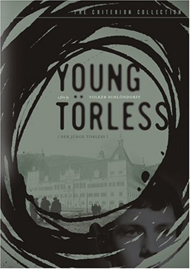| Release List | Reviews | Price Search | Shop | Newsletter | Forum | DVD Giveaways | Blu-Ray/ HD DVD | Advertise |
| Reviews & Columns |
|
Reviews DVD TV on DVD Blu-ray International DVDs Theatrical Reviews by Studio Video Games Features Collector Series DVDs Easter Egg Database Interviews DVD Talk TV DVD Talk Radio Feature Articles Columns Anime Talk DVD Savant HD Talk Horror DVDs Silent DVD
|
DVD Talk Forum |
|
|
| Resources |
|
DVD Price Search Customer Service #'s RCE Info Links |
|
Columns
|
 |
Young Törless
|
||||
This thoughtful and finely-crafted first film from Volker Schlöndorff is considered the beginning of the New German Cinema, or the Young German Cinema. Decrying German films confined to guilty musings over WW2 or mindless Heimat escapism about rural values, directors like Schlöndorff, Rainer Werner Fassbinder, Wim Wenders and Werner Herzog revitalized the national industry with challenging new methods and ideas. Der junge Törless is a thought-provoking examination of schoolboy days as remembered by Robert Musil, a WW1 soldier. Although it takes place in the old Austro-Hungarian Empire, the pitiless mindset and cruel activities seen here are often likened to Nazi ideology. But what transpires will be easily recognized by anybody who ever went to school, practically anywhere. The one difference is that some of these intense German youths think about what they're doing and rationalize it in speech.
Der junge Törless is an excellent look at an almost universal situation - school bullying out of control - that shows the more mature outlook of the New German Cinema by refusing to frame itself in a preconceived moral pattern. The schoolboys naturally seek out anyone different or helpless to pick on, and they find their perfect patsy in the weak Basini. He foolishly thinks he can hide his little crimes, a fault that perversely predatory boys use to make his life hell. Even in benign situations, the formula in Törless mirrors real life. When someone weak and sensitive doesn't stand up to abuse, his dishonorable behavior is used to justify more abuse. The victim is "asking for it." I don't know how the chemistry works with young girls, but with boys it's exactly like this. Individuals seek the security of being part of a group. The group multiplies the daring of the individual, who hides behind the group while seeking out weaker individuals to dominate. All of these students are from reasonably wealthy families and already initiated into various hypocrisies: Hiding vices from their parents, ignoring or stonewalling their clueless teachers and visiting prostitutes as recreation. Horror star Barbara Steele has one of her best roles greeting two boys and making fun of their illusions. It's an isolated scene but very successful. One of Thomas� sadistic friends is willing to explain how his world-view justifies the tormenting of Basini. His rationale does sound like Nazi philosophy, that the strong have some kind of duty to rid the world of the weak and unfit. Basini is identified as Jewish, which in these boys' thinking is just another proof of inferiority and not a specific crime in itself. Just the same, the level of bigotry and hidden violence is staggering. Casual cruelty is treated as a recreational activity to prepare for the future. Thomas Törless remains a detached observer. His ability to stay coolly interested in a process that personally disgusts him is disturbing but familiar human behavior. When the final formal investigation comes, the other boys front a consistent defense of lies and feigned innocence. Thomas instead tells the schoolmasters what's really going on, from his personal viewpoint. Predictably, the authorities opt for a hasty verdict that involves minimal thought and doesn't rock the boat: The school system is healthy except for a few disturbed or unstable elements (like Törless) that need to be weeded out. That kind of supervision is something we all learn in the first grade: "I don't care who did what or what's going on, just so long as it stops and things return to normal." In other words, a main lesson taught in school is that nobody cares about right and wrong and the best thing to do is to look out for one's self. Anyone trying to probe the nature of right and wrong might as well be talking to the walls. Volker Schlöndorff's film is beautifully shot in B&W and directed with an ease not seen in many first movies. The acting is exceptional throughout, with the four main boys almost perfectly presented. Some reviews harp on the idea that as the hero Thomas should be standing up for what's right and defending the weak, like Superman or something. Schlöndorff refuses to criticize the characters along those lines, making the movie more powerful than most other boarding school allegories. Viewers need to note that although there is no sexual activity in the movie, there is one brief scene where the boys torment and kill a mouse. Criterion's DVD of Young Törless is a fine enhanced transfer with strong audio. B&W movies with gray-on-gray cinematography frequently look dull on video, but these images have depth and impact. The extras get right to the heart of the matter. In his interview Schlöndorff tells us of his background, how the film was made and what its eventual impact was. Hans Werner Henze's original score is also presented, introduced by the director. There's a stills gallery and an original trailer as well. Timothy Corrigan provides a liner note essay.
On a scale of Excellent, Good, Fair, and Poor,
Young Törless rates:
Review Staff | About DVD Talk | Newsletter Subscribe | Join DVD Talk Forum |
|
| Release List | Reviews | Price Search | Shop | SUBSCRIBE | Forum | DVD Giveaways | Blu-Ray/ HD DVD | Advertise |






